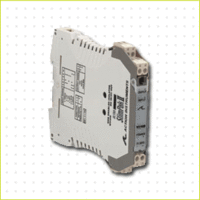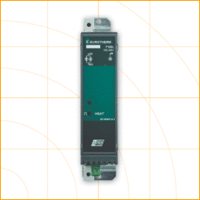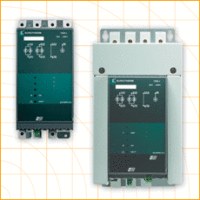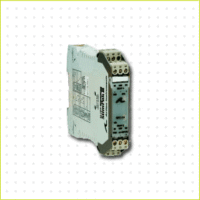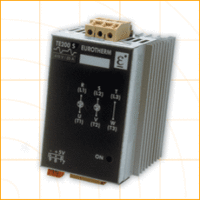Product Description
WV108 Limit Alarm
WV108 Limit Alarm
The Ultra SlimPak II is an exciting new line of isolating signal conditioners from Action Instruments with greater accuracy and better stability than virtually any other signal conditioners on the market today.
The WV108 is a DC Voltage or Current Input Limit Alarm with dual setpoints and two contact closure outputs. The input type and alarm functions are field configurable, offering maximum flexibility. There are five input voltage ranges between ±20mV and ±200V, and two current input ranges, ±10mA and ±100mA. Alarm setpoints are fully adjustable throughout the entire range.
The WV108-2000 contains two standard non-latching SPDT relays. When power is removed, the relays revert to their non-powered state. The WV108-2001 contains two latching relays. Whatever position the relays are in when power is removed is where they will remain when power is re-applied (a reset switch is provided to reset the relays after the alarm is no longer true). Both models are configurable as a single or dual setpoint alarm, with HI or LO trips. The WV108-2000 supports failsafe or non-failsafe operation. In failsafe operation the relay coil is energized when the process is below the HI setpoint or above the LO setpoint (opposite for non-failsafe). In the failsafe mode, a power failure results in an alarm state output.
Operation
Each of the alarm setpoints has a respective HI or LO deadband. Red LEDs will illuminate indicating an alarm condition. The trip will reset only when the process falls below the HI deadband or rises above the LO deadband. (The WV108-2001 requires pressing the reset switch in order to reset the relays after being tripped.) The deadband can be left at the minimum level (the factory default) or can be set to whatever level is desired.
Enhanced LED Diagnostics
Other than when executing the pushbutton calibration routine, the LEDs blink under the following conditions:
RUN (Green):
- On when unit is powered.
- Flashes at 2Hz when input is under range.
- Flashes at 8Hz when input is over range.
SETPOINT A (Red):
- On when Setpoint A is tripped.
- On when setting Setpoint A.
- Flashes while calibrating the input level.
SETPOINT B (Red):
- On when Setpoint B is tripped.
- On when setting Setpoint B.
- On while calibrating the input level.
An Under Range condition exists when the signal is lower than the operational low value minus 6.25% of the operational span. An Over Range condition exists when the signal is higher than the operational high value plus 6.25% of the operational span.
Options
C620 Factory calibration of input range, setpoints and output relays.
24VDC Transducer Excitation
The 24VDC source, which is isolated from line power, is used for transducer excitation. Typical connections for voltage and current are shown in Figure 5.
Configuring Modules
Unless otherwise specified, the factory presets the Model WV108 as follows:
| Input: | Current |
| Range: | ±100mA |
| Output: | Dual, SPDT |
| Trip: | A: HI, B: LO |
| Failsafe: | No |
| Deadband: | A, B: minimum |
- For other ranges, refer to the SWITCH SETTINGS table (see Figure 6). Reconfigure switches S1 and S2 for the desired input type and range.
- Set position 1 of S1 to ON if a WVC16 will be utilized and remote calibration capability is desired.
- Set position 2 and 3 of S1 to ON for a Hi trip setpoint or to OFF for a Low trip setpoint.
- Set position 4 of S1 to ON for failsafe operation (e.g. alarm trips upon power failure) or OFF for non-failsafe operation (-2000 only).
It is also possible to remotely select the setpoints using an Ethernet connection and the optional WVC16 WebView Communications Interface module.
Relay Protection and EMI Suppression
When switching inductive loads, maximum relay life and transient EMI suppression is achieved using external protection (see Figures 2 & 3). Place all protection devices directly across the load and minimize all lead lengths. For AC inductive loads, place a properly rated MOV across the load in parallel with a series RC snubber. Use a 0.01 to 0.1µF pulse film capacitor (foil polypropylene recommended) of sufficient voltage, and a 47Ω, 1/ 2W carbon resistor. For DC inductive loads, place a diode across the load (PRV > DC supply, 1N4006 recommended) with (+) to cathode and (-) to anode (the RC snubber is an optional enhancement).
WV16 Communications Interface (Optional)
The WVC16 Communications Interface adds functionality never before found in a signal conditioning system. The WVC16 interfaces with Ultra SlimPak II devices via an internal infrared communications link (no programming required) and provides the ability to connect as many as 32 modules to the intranet, allowing the user to view process data on a near real time basis, perform data logging functions on specified modules, calibrate the signal conditioners remotely, and view diagnostic information.
The WVC16 contains a web page server and an e-mail server. Browsers supported include Internet Explorer 5 or later and Netscape Navigator 4.7 or later. The user has the ability to have setpoint trip conditions generate an e-mail message for up to 10 recipients. The module also contains a countdown timer that can be used to notify when routine maintenance is required, such as re-calibration. The internal temperature of the module can also be monitored. All memory to support the signal conditioner’s historical data, storage of the web pages and all e-mail messages is contained in the WVC16.
The WVC16 downloads a JAVA applet to the client’s computer. The applet provides access to the signal conditioner’s data, which includes the following:
- Module configuration summary
- Module configuration editing
- Diagnostic/warning status
- Alarm setup & status
- E-mail setup, editing & address book
- Process variable viewing
Calibration
The calibration procedure is contained in the Installation & Calibration Instructions document, which is available on our website (www.actionio.com). You can also obtain it by telephoning Action technical support (703- 669-1318).
Note that Custom Calibration (option C620) is available from the factory (settings MUST be within the units specifications). For a C620, specify the following:
- Input Type (mA, mV, V).
- Setpoint A trip point and reset point.
- Setpoint B trip point and reset point.
- Failsafe (ON/OFF).
TECHNICAL SPECIFICATION (WV108)
Inputs
Voltage Input
- Ranges: ±20mV, ±200mV, ±2V, ±20V & ±200V
- Impedance: >100k ohms
- Overvoltage: 200Vrms, max.
Current Input
- Range: ±10mA & ±100mA
- Impedance: 70 ohms, typical
- Overcurrent: 170mA rms, max
- Overvoltage: 60VDC
Response Time
- Dynamic Deadband: Relay status will change when proper setpoint/process condition exists for 100mSec or greater
- Normal Mode: <250mSec (analog filtering)
Setpoint Effectivity:
Setpoints are adjustable (by pushbutton) over 100% of the selected input span
Repeatability
- >200mV/10mA: 0.1% of full scale (constant temperature)
- <200mV/10mA: 0.2% of full scale
Relay Contacts
- 2 SPDT (2 form C) Relays
- 1 relay per setpoint
Current rating (general use)
120VAC: 5A; 240VAC: 2A; 28VDC: 5A
Material
Gold flash over silver alloy
Electrical Life
105 operations
Reset Switch
For unlatching the relay once the process is no longer in the alarm state (WV108-2001 only).
Local Range Selection
By DIP switch
Stability
±100ppm of FS/°C
Common Mode Rejection
120dB @ DC, >90dB @ 60Hz, or better
Isolation
1800VDC or peak AC between contacts, input & power
ESD Susceptibility
Capable of meeting IEC 801-2 level 3 (8kV)
Humidity
- Operating: 15 to 95% RH non-condensing @45°C
- Soak: 90% RH non-condensing for 24hrs @60°C
Temperature
- Operating: 0 to 60°C
- Storage: -25 to +85°C
Power
- 9 to 30VDC
- 1.2W typ., (2.2W max. with both relays energized)
Excitation Voltage
24VDC @ 20mA
Host Module Interface
IR link
Size
DIN rail case – refer to Dimensions drawing
Environmental
- Operating Temperature: 0°C to +60°C (32 to 140°F)
- Storage Temperature: -25°C to +85°C (-13 to 185°F)
- Operating Relative Humidity (non-condensing) : 15% to 95%RH at 45°
- Non-operating Relative Humidity (non-condensing): 90%RH at 60°C for 24 hours
Agency Approvals
- CE, EN61326, EN61010-1 (EMC & Safety)
- UL and CSA Combined mark
Minimum Deadband (Range, Deadband):
- ±20mV: 0.2% (80 microvolts)
- ±200mV: 0.2% (800 microvolts)
- ±2V: 0.1% (4mV)
- ±20V: 0.1% (40mV)
- ±200V: 0.025% (100mV)
- ±10mA: 0.1% (20 microamps)
- ±100mA: 0.025% (50 microamps)

